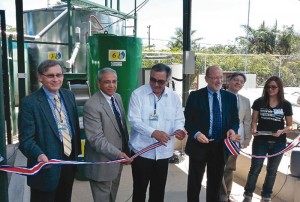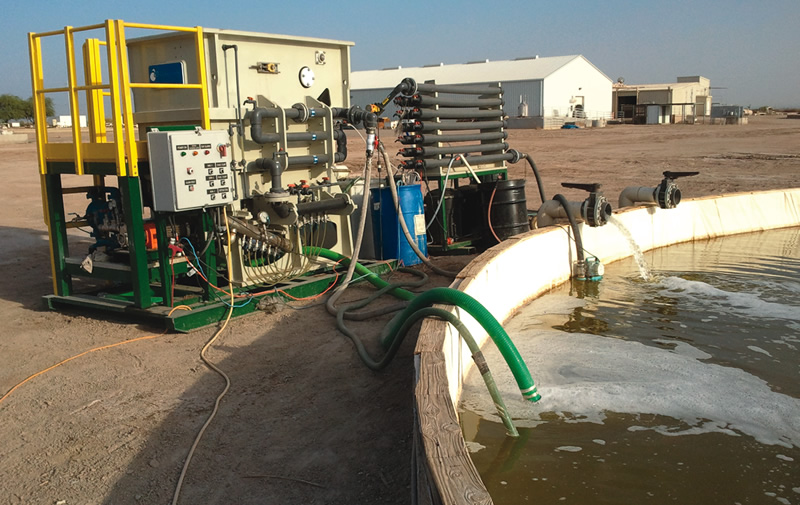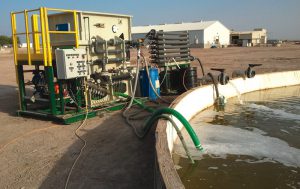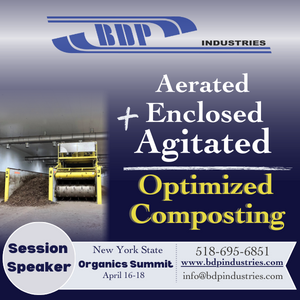
Dedication of a new anaerobic digester, installed at the Fabio Baudrit Experimental Station in Alajuela, CA
San José, Costa Rica: Small-Scale Digester Up And Running
Engineers from Michigan State University’s (MSU) Department of Biosystems and Agricultural Engineering (DBAE) are working closely with the University of Costa Rica (UCR) in San José to develop self-sustained renewable energy systems in Costa Rica. Dedication of a new anaerobic digester, installed at the Fabio Baudrit Experimental Station in Alajuela, just outside of San José, was held in mid-May. The small-scale, self-sustained renewable energy system integrates solar and biological technologies to treat waste streams, generate power, produce fertilizers and reclaim water. “Development of economical on-site renewable energy systems using agricultural and municipal waste streams will help rural communities in Central America increase access to affordable clean energy, advance development of low-emission and high-efficiency energy technologies, fight energy poverty, alleviate environmental impacts of waste streams on air and water quality, and generate valuable by-products,” says Wei Liao, Assistant Professor in MSU’s DBAE, who works with Dana Kirk, also of MSU.
Liao and Kirk are working with colleagues at UCR to determine the effects of a tropical climate on the machine and are testing a range of available organic waste materials, including manure and food scraps. Using solar energy, the material is heated to about 115°F for 20 days. The project is expected to provide energy for a recycling center at the Experiment Station. It was funded by a $1 million grant from the U.S. Department of State’s Division of Western Hemisphere Affairs. Partners included the University of Costa Rica, Nicaragua’s Universidad Nacional Autónoma de Nicaragua León, and Panama’s Universidad Autónoma de Chiriquí.
Washington, DC: Latest Farm Digester Data
As of May 2013, U.S. EPA’s AgSTAR estimates there are 202 anaerobic digester systems operating at commercial livestock farms in the United States. The number of digesters by farm type are as follows: Dairy—167; Swine—23; Poultry—4; Beef—3; Mixed manures—5. Wisconsin has the most operating dairy digesters, followed by New York, Pennsylvania, Vermont, California and Ohio. North Carolina and Pennsylvania have the greatest number of swine manure digesters. Spreadsheets available to download on the AgSTAR website — http://www.epa.gov/agstar/projects/index.html — show projects in the following stages: construction, operational, and shutdown. Updated information and analysis of the digester systems is underway and will be available soon. The AgSTAR database also provides more detailed information about operating projects.
Nantwich and Shrewsbury, UK: AD Tour In English Countryside
In early July, prior to the start of the UK AD & Biogas 2013 conference and trade show, the Anaerobic Digestion and Biogas Association (ADBA) took a group of participants to the English countryside to visit two sites with farm-based anaerobic digestion systems. The Farming and Food Production arm of Reaseheath College near Nantwich in Cheshire has gotten funding to build two demonstration-scale low-capital cost systems for research, in collaboration with local farmers. Commissioned in 2011, a continuously stirred tank reactor (CSTR) digests slurry from the college’s 300-head dairy herd and manure from 130 pigs. The second unit, a smaller “plug and play” prefabricated modular design digester, only takes slurry. A 50 kW combined heat and power (CHP) unit and 70 kW boiler provide between 10 to 15 percent of the college’s heat and electricity. Trials are being run on digestate utilization.
Wykey Farm, located several miles outside of Shrewsbury, was the second destination. Its 1 MW semiplug flow installation commissioned in 2012 utilizes around 25,350 tons/year of feedstocks (pig and cow slurry, poultry litter, grass, maize silage and fodder beet grown for the digester) to power two 500 kW CHP units. Digestate is supplied primarily to the farm’s fields via irrigation equipment and spreading. Marshes Biogas in Shropshire designed and built the AD systems at both sites, and provides ongoing testing and monitoring for Wykey Farm. BioCycle was a partner for UK AD&Biogas 2013.
Yaphank, New York: Dispute Resolution Includes Anaerobic Digester
The New York State Department of Environmental Conservation (DEC) and Long Island Compost Corp., operators of a facility in Yaphank that recycles organic materials, have reached an agreement for major changes in operating procedures to reduce impacts to nearby communities, announced DEC Regional Director Peter Scully in late June. Under the agreement, the facility will refocus its operation to include the first use of an anaerobic digester for recycling of organic materials on Long Island. “We are using an enhanced anaerobic digestion process supplied by GWE, our technology partner,” says Charles Vigliotti, who founded Long Island Compost with his brother over 20 years ago. The company receives organics — primarily yard trimmings and woody waste — at its preprocessing/ transfer facility in Yaphank, along with finished compost and mulch for distribution. The actual composting takes place at about 30 decentralized sites on Long Island. The anaerobic digester is being developed in two phases, both scaled for 60,000 tons/year of source separated pre and postconsumer food waste streams, as well as some restaurant grease trap waste. “We’ll also process about 10,000 tons/year of grass clippings,” adds Vigliotti.
The agreement follows months of mediation between DEC and Long Island Compost, and successful collaboration with the Brookhaven Community Coalition, which is comprised of local community groups and Citizens Campaign for the Environment. The process was triggered by DEC’s decision to modify the facility’s operating permit to address longstanding dust and odor concerns. “This historic agreement is a shining example of what can happen when the community is engaged through an open and transparent outreach process,” said Scully. “Recycling of organic materials is a critically important part of successful efforts to manage solid waste on Long Island, and sound operating practices will ensure that these activities can take place without significant impacts to the community.”
In addition to installing an anaerobic digestion system on the 62-acre site, stipulations in the agreement include: Construct an enclosed tipping hall with state-of-the-art odor control technology; Enclose leaf debagging operations; Reduce the amounts of wood mulch and land-clearing debris stored at the site; Pave high traffic areas of the facility to reduce dust impacts; Convert existing diesel operating equipment to electrical or compressed natural gas motors; Convert the facility vehicle fleet to alternative fuels (including compressed renewable natural gas), resulting in a reduction of 400,000 gallons of diesel fuel per year and reduced impacts to air quality; and Implement a monitoring plan to track any changes in groundwater quality at the facility. The company will be required to submit two applications to DEC: one to modify the existing solid waste permit, and another to authorize the proposed anaerobic digester. Both permit applications will be the subject of a public review process. “We are hoping to have our permits in place and shovels in the ground by the end of this year, and start operating the digester in the fourth quarter of 2014,” says Vigliotti.
San Diego, California: Harvesting Algal Biomass For Biofuel
Since 2008, the San Diego Center for Algal Biotechnology (SD-CAB) has been conducting research into algal applications for biofuel. This has been a joint collaboration between several departments of the University of California (UC) San Diego faculty and students, the University’s Scripps Institution of Oceanography, the Scripps Research Institute, as well as industrial corporate participants. In 2011, the Center moved beyond its campus-oriented algae research facility in San Diego and utilized a field laboratory in the Imperial Valley of California, about 100 miles east. One-acre ponds were made available by Carbon Capture Corporation. The SD-CAB was well-versed and equipped to grow algae, dry the biomass on racks to remove 90 percent of the water, extract the oil with a screw press and purify it in a centrifuge, and convert the oil to biodiesel using a traditional open-processing reaction method. But SD-CAB had little experience harvesting algae from one-acre ponds, posing a considerable obstacle. “We knew, starting off, that the biggest challenge would be the harvest,” says Kristian Gustavson, part of the UCSD student-led, algae-based biodiesel research study.
Gustavson was able to join forces with World Water Works, which had developed the Algae Harvesting Technology Optimized (AHTO) dissolved air flotation system (DAF). Pond water is pumped into the DAF where suspended solids in the form of algae are separated from the water by a process of dissolving air into the water under pressure, with the addition of a flocculent. Upon release of that pressure, microbubbles form and interact with the algae particles, attaching to the biomass surface and affecting the particle density, causing them to float to the surface of the DAF. They are then skimmed with a chain and flight mechanism to a sieved “Thickening Beach™. The free water is drained and the algae particles are thickened, enabling biomass separation. The clean water is continuously removed from the DAF and piped back into the ponds. “We got the chemistry set and were able to harvest continually from the ponds,” notes B. Greg Mitchell, research biologist at Scripps Institution of Oceanography and associate director of SD-CAB.
Ithaca, New York: Resource Library On Updated Cornell Website
Cornell University’s PRO-Dairy initiative has a new name — Dairy Environmental Systems — and an updated website that has been revamped to include a Resource Library. The library is part of a Workforce Development Project funded by NYSERDA, the New York State Energy Research and Development Authority. Documents specific to many topics surrounding dairy farms, manure management and anaerobic digestion can be accessed free of charge. In addition, papers, posters, presentations and reports to include in the Resource Library can be submitted for consideration. Visit www.manuremanagement.cornell.edu.











